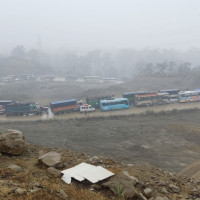- Sunday, 4 May 2025
Clear Development Plan
The coalition government of the Nepali Congress and CPN-UML have unveiled their first policies and programmes, offering its vision for the development and prosperity of the country. Constituted more than 10 months ago, the government has emphasised political stability, good governance and consensus-based constitution amendment. On Friday, President Ramchandra Paudel presented the government’s policies and programmes for the upcoming Fiscal Year 2025/26 at the joint session of the Federal Parliament. President Paudel said that the government would review the constitution to bolster its positive aspects and rectify the shortcomings that come in the way of its implementation. In 2015, Nepal adopted a historic constitution that established a federal, republican and secular democratic system.
The idea of statute amendment must have satisfied the political parties from the ruling and opposition benches because this was one of the crucial aspects in the seven-point agreement between the NC and UML. However, the policy document has a greater focus on the development of entrepreneurship, production, productivity, and job creation. Emphasis on infrastructure development and commercialisation of agriculture through cooperation, coordination, and collaboration among the three levels of government is expected to yield the desired outcome. Nepal needs to generate employment opportunities to check the swelling out-migration, and this can be possible through industrialisation and investment in the agro sector.
The policy aims to finish the ongoing development projects in time, check wasteful expenditure through termination, merger and transfer of unnecessary structures. The government commits to expanding 'faceless services', eliminating duplication in development programmes, implementing recommendations of the High-Level Economic Reform and Recommendation Commission, maintaining harmony between fiscal and monetary policies, creating a business-friendly environment and promoting allocative efficiency in public expenditure. The pledge to cut rising regular expenses will enable spending on the social sector and fuel development.
The document includes reforms in the tax system, optimal use of information technology, foreign investment in high-return industrial projects, enhanced access to climate funds, promotion of private sector investment, establishment of an Alternative Development Finance Fund and formulation of laws related to finance, trade and commodity. Operation of digital banks, expansion of insurance services, the development of reservoir-based and multipurpose hydropower projects, construction of national and cross-border high-capacity transmission lines in the participation of the private sector and investing remittances in mega hydropower projects will contribute to the economic growth and job creation.
The participation of all employees, regardless of the nature and terms of their employment, in the contribution-based Social Security Fund will benefit those in need of support at the time of a medical emergency or job loss. Commitment to approve the much-talked-about School Education Bill from the ongoing budget session of the parliament will pave the way for broader reform in public education. Nepal will be upgraded to a full anti-money laundering compliant country by the year 2083 B.S., which will delist it from falling into the Financial Action Task Force (FATF) "grey list" time and again.
'Healthy Nepal Campaign' will encourage Nepalis to adopt preventive and curative methods and lead a healthy and happy life. The announcement to grant scholarships to the international medal-winning sports players and their children for their education will prove an important step in developing the Nepali sports sector. The policy and programmes are ambitious and timely. Now, the ruling parties and government must demonstrate their strong will to implement them effectively, thereby realising the motto of 'Prosperous Nepal, Happy Nepalis."

















